Considering all the overlapping releases available on the market, it is getting harder and harder to choose a basic library of old-time blues records, and while I by no means have heard all of the offerings, I can certainly make some basic recommendations. So, forthwith, here are some prewar blues suggestions, drawn from CDs currently available on the internet and at stores.
First off, I have three CDs I have compiled and am selling off my Unique Blues CDs page:
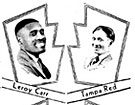
When I Take My Vacation
in Harlem:
Blues Legends Sing Pop
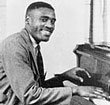
Leroy Carr:
The Many Sides of a Master
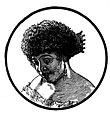
Ida Cox:
Uncrowned Queen of the Blues
Other recommendations would include:
Ma Rainey: Mother of the Blues: 1923-1928 (Epm Musique)
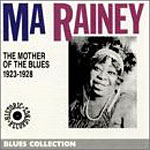 This is a fine collection of songs by the woman who made a quite
believable claim to having been the originator of the term "blues" as
a name for a musical style, and who was almost certainly the first great
touring blues star. Ma Rainey started out in black vaudeville around
the turn of the 20th century. Often cited as a pioneer and mentor to
Bessie Smith, Rainey was also a magnificent singer in her own right,
whose records are rougher and often more exciting than those of any
of her many followers. She had interesting taste in accompanists, ranging
from plain piano to full jazz bands, to guitar or banjo. This set gives
a good sense of her range, and includes such classics as "See See Rider,"
which she turned into an enduring standard. Especially to "country blues"
fans, Rainey remains the queen of early blues singers, and it is a pity
that she is not more widely heard.
This is a fine collection of songs by the woman who made a quite
believable claim to having been the originator of the term "blues" as
a name for a musical style, and who was almost certainly the first great
touring blues star. Ma Rainey started out in black vaudeville around
the turn of the 20th century. Often cited as a pioneer and mentor to
Bessie Smith, Rainey was also a magnificent singer in her own right,
whose records are rougher and often more exciting than those of any
of her many followers. She had interesting taste in accompanists, ranging
from plain piano to full jazz bands, to guitar or banjo. This set gives
a good sense of her range, and includes such classics as "See See Rider,"
which she turned into an enduring standard. Especially to "country blues"
fans, Rainey remains the queen of early blues singers, and it is a pity
that she is not more widely heard.
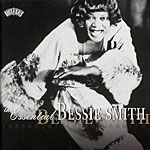 There is not a lot to say about Bessie Smith that has not already
been said thousands of times, but she is certainly well worth hearing.
Not only was she by most estimations the greatest blues singer of the
1920s, but she had extraordinary good fortune in accompanists, from
James P. Johnson's piano work to Louis Armstrong's frequent trumpet
obbligattos. Like Shakespeare, Smith has sometimes been unfairly asked
to shoulder an entire era, and it is worth mentioning that singers like
Ma Rainey, Alberta Hunter,Victoria Spivey, Ida Cox, and Clara Smith
all had their fans, and strengths that Bessie did not by any means always
exceed. On the other hand, none of them has as nice a "best of" collection
as this.
There is not a lot to say about Bessie Smith that has not already
been said thousands of times, but she is certainly well worth hearing.
Not only was she by most estimations the greatest blues singer of the
1920s, but she had extraordinary good fortune in accompanists, from
James P. Johnson's piano work to Louis Armstrong's frequent trumpet
obbligattos. Like Shakespeare, Smith has sometimes been unfairly asked
to shoulder an entire era, and it is worth mentioning that singers like
Ma Rainey, Alberta Hunter,Victoria Spivey, Ida Cox, and Clara Smith
all had their fans, and strengths that Bessie did not by any means always
exceed. On the other hand, none of them has as nice a "best of" collection
as this.
As I suggest above, there are disgracefully few collections devoted to the work of the great women blues singers. There should be great CDs of Victoria Spivey and Sippie Wallace, both extraordinary songwriters as well as powerful and unique singers. Clara Smith, "the queen of the moaners," was considered by many blues fans of the 1920s to be even greater than Bessie (who was no relation). Ida Cox kept a major touring blues revue on the road longer than any other star of the period, and originated many songs that were later associated with male artists, such as "How Long Blues." And then there were the smoother vaudevillian blues stars, such as Alberta Hunter, whose "'Tain't Nobody's Business" may be the most famous blues song of the era. For the moment, none of these artists is properly presented on discs, so I would have to recommend that new listeners start off with a couple of decent anthologies, get an idea of the strengths of various singers, then explore further following their own tastes.
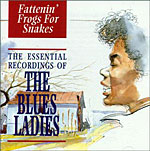 The best single disc sampler of the great blueswomen is Indigo Records'
Fattenin' Frogs For Snakes: The Essential Recordings Of The Blues
Ladies, which touches on most of the major artists from Ma Rainey
to Dinah Washington, representing each with one or two of her biggest
hits. This is a wonderfully varied set, traveling from the early queens
singing over full jazz bands to 1930s artists like Georegia White and
Lil Johnson, with their lighter, combo style. There are too many classic
cuts to list here, but I would mention Alberta Hunter's "Nobody Knows
the Way I Feel this Morning," Clara Smith's "Don't Advertise Your Man,"
Ida Cox's "How Long, Daddy, How Long" with Papa Charlie Jackson on banjo,
Spivey's "Black Snake Moan" (though there is a skip in the first line...)
and Chippie Hill's "Trouble in Mind." The only drawback to this album
is that it may be a little hard to find, but if you can get it, it is
definitely the best place to start.
The best single disc sampler of the great blueswomen is Indigo Records'
Fattenin' Frogs For Snakes: The Essential Recordings Of The Blues
Ladies, which touches on most of the major artists from Ma Rainey
to Dinah Washington, representing each with one or two of her biggest
hits. This is a wonderfully varied set, traveling from the early queens
singing over full jazz bands to 1930s artists like Georegia White and
Lil Johnson, with their lighter, combo style. There are too many classic
cuts to list here, but I would mention Alberta Hunter's "Nobody Knows
the Way I Feel this Morning," Clara Smith's "Don't Advertise Your Man,"
Ida Cox's "How Long, Daddy, How Long" with Papa Charlie Jackson on banjo,
Spivey's "Black Snake Moan" (though there is a skip in the first line...)
and Chippie Hill's "Trouble in Mind." The only drawback to this album
is that it may be a little hard to find, but if you can get it, it is
definitely the best place to start.
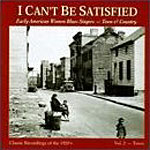 For a quirkier selection, but with excellent sound quality, it is
well worth hearing Yazoo Records' I Can't Be Satisfied: Early American
Women Blues Singers, Vol. 2: Town, a companion volume to the company's
exceptional anthology of rural women singers. It includes classic records
like Spivey's "Dirty T.B. Blues" and Bertha "Chippie"
Hill's "Trouble in Mind," but as is typical with Yazoo, the concentration
is on exceptional performances rather than records that were particularly
popular or influential. The result is a very strong anthology, but one
that often favors delightful obscurities like "Parlor Social Deluxe"
over masterpieces like "Wild Women Don't Have the Blues," which the
Yazoo folks probably consider over-anthologized... .
For a quirkier selection, but with excellent sound quality, it is
well worth hearing Yazoo Records' I Can't Be Satisfied: Early American
Women Blues Singers, Vol. 2: Town, a companion volume to the company's
exceptional anthology of rural women singers. It includes classic records
like Spivey's "Dirty T.B. Blues" and Bertha "Chippie"
Hill's "Trouble in Mind," but as is typical with Yazoo, the concentration
is on exceptional performances rather than records that were particularly
popular or influential. The result is a very strong anthology, but one
that often favors delightful obscurities like "Parlor Social Deluxe"
over masterpieces like "Wild Women Don't Have the Blues," which the
Yazoo folks probably consider over-anthologized... .
If the Indigo set is not available, another reasonably competent overview is presented on Rhino Records' Blues Masters, Vol. 11: Classic Blues Women, a more limited selection, but still very engaging, and tracing the female blues tradition from Mamie Smith's groundbreaking "Crazy Blues" to Billie Holiday.
 Lemon Jefferson was the first major "country
blues" star, and he remains one of the most excitingly idiosyncratic
performers in American music, and the single most important guitarist-singer
of the 1920s. His voice is huge and powerful, and his guitar work has
a rhythmic quirkiness unlike anything else in blues (including the work
of his many immitators). His songs include a few pre-blues numbers,
as well as many original compositions in the 12-bar form, and several
became classics, like "Black Snake Moan" and "Matchbox Blues." There
is a budget box set of Jefferson's complete recordings available from
JSP, but the fact is that under the commercial pressures of the 1920s
he recorded a lot of songs that are virtually indistinguishable from
each other, and he is better served by a good anthology, such as this
set, which well-chosen, with good notes and Yazoo's usual first-rate
sound quality (but be warned: Jefferson recorded all but a couple of
his sides for the notoriously low-fi Paramount label, and the sound
leaves something to be desired).
Lemon Jefferson was the first major "country
blues" star, and he remains one of the most excitingly idiosyncratic
performers in American music, and the single most important guitarist-singer
of the 1920s. His voice is huge and powerful, and his guitar work has
a rhythmic quirkiness unlike anything else in blues (including the work
of his many immitators). His songs include a few pre-blues numbers,
as well as many original compositions in the 12-bar form, and several
became classics, like "Black Snake Moan" and "Matchbox Blues." There
is a budget box set of Jefferson's complete recordings available from
JSP, but the fact is that under the commercial pressures of the 1920s
he recorded a lot of songs that are virtually indistinguishable from
each other, and he is better served by a good anthology, such as this
set, which well-chosen, with good notes and Yazoo's usual first-rate
sound quality (but be warned: Jefferson recorded all but a couple of
his sides for the notoriously low-fi Paramount label, and the sound
leaves something to be desired).
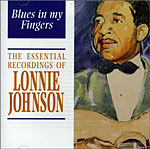 Blues in My Fingers
(Indigo)
Blues in My Fingers
(Indigo) Lonnie Johnson was the second major male blues star, and he could hardly have been more different from Jefferson. A sophisticated multi-instrumentalist from New Orleans, he was really more of a male "blues queen" than a countrified guitarist-singer. Today, he is generally thought of first of all as a guitarist (as witness this album title, but in the 1920s and 1930s he was far better known as a singer, a smooth crooner whose ability to range freely over jazz, pop, and blues styles makes him an obvious predecessor to Nat Cole and George Benson. This set gives an excellent picture of his range, from more traditional blues like "Careless Love" to the jiving "Uncle Ned Don't Use Your Head," to blues and jazz instrumentals. Johnson was said to be Robert Johnson's favorite recording star, and as one listens to this set it is easy to see how a Delta artist would have dreamed of being able to play with this kind of delicacy, speed, and sophisticated soul. To buy from Amazon, click here.
 For another side of Johnson's work, it is well worth checking out
Playing With the Strings, an excellent anthology of his jazz
recordings with Louis Armstrong, Eddie Lang, and the Duke Ellington
orchestra, which shows why he is often called the father of jazz guitar.
Not strictly blues (though the album has some of that, too), this is
an important reminder of how false the distinction between blues and
jazz really was in the days when both were hot, contemporary pop styles.
For another side of Johnson's work, it is well worth checking out
Playing With the Strings, an excellent anthology of his jazz
recordings with Louis Armstrong, Eddie Lang, and the Duke Ellington
orchestra, which shows why he is often called the father of jazz guitar.
Not strictly blues (though the album has some of that, too), this is
an important reminder of how false the distinction between blues and
jazz really was in the days when both were hot, contemporary pop styles.
 In 1928, Leroy Carr made his recording debut with "How Long--How
Long Blues" and changed the blues world forever. Unlike most of the
blues queens and rural singers who had preceded him, Carr was a smooth
crooner, accompanied by his own piano and the guitar of Scrapper Blackwell,
and his beautifully written, meditative lyrics set the pattern for
generations of future singers, from blues artists like Robert Johnson
and Bumble Bee Slim to Charles Brown, Count Basie, Nat King Cole,
Ray Charles, and Sam Cooke. Best known for ballads like "How Long,"
"Blues Before Sunrise," and "In the Evening When the Sun Goes Down,"
Carr also recorded a series of unique comic numbers like "Papa's on
the Housetop" and "Gettin' All Wet," and Tin Pan Alley pop songs.
Unfortunately, none of the available anthologies show the full breadth
of his talent, while his complete recordings (available on Document
Records) get pretty repetitive. Until someone puts out the anthology
of my dreams, the best option is this set, which gives a good overview
of Carr and Blackwell, and includes most of their most important cuts.
In 1928, Leroy Carr made his recording debut with "How Long--How
Long Blues" and changed the blues world forever. Unlike most of the
blues queens and rural singers who had preceded him, Carr was a smooth
crooner, accompanied by his own piano and the guitar of Scrapper Blackwell,
and his beautifully written, meditative lyrics set the pattern for
generations of future singers, from blues artists like Robert Johnson
and Bumble Bee Slim to Charles Brown, Count Basie, Nat King Cole,
Ray Charles, and Sam Cooke. Best known for ballads like "How Long,"
"Blues Before Sunrise," and "In the Evening When the Sun Goes Down,"
Carr also recorded a series of unique comic numbers like "Papa's on
the Housetop" and "Gettin' All Wet," and Tin Pan Alley pop songs.
Unfortunately, none of the available anthologies show the full breadth
of his talent, while his complete recordings (available on Document
Records) get pretty repetitive. Until someone puts out the anthology
of my dreams, the best option is this set, which gives a good overview
of Carr and Blackwell, and includes most of their most important cuts.
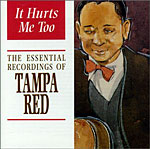 Tampa Red was the most-recorded blues singer of the pre-war era,
but he has often been passed over by later fans because he had a rather
light voice, loved to play kazoo, and would never be mistaken for a
deep Delta moaner. What is odd about this is that the Delta fans often
emphasize slide guitar, and Red was without a doubt the most influential
slide player in blues, at least until the 1960s. This album ranges from
his hokum classic, "It's Tight Like That," one of the most immitated
songs of the era, to meditative instrumentals like "You Got To Reap
What You Sow" (note the resemblance to Robert Johnson's "Come on in
My Kitchen"), "Black Angel Blues," which would be memorably covered
by B.B. King as "Sweet Little Angel," and two songs that gave Elmore
James and the later electric stars the textbook on how to play slow
blues slide: the title track and "Anna Lou." And then, there are wonderful
oddities like "Let Me Play with Your Poodle"...
Tampa Red was the most-recorded blues singer of the pre-war era,
but he has often been passed over by later fans because he had a rather
light voice, loved to play kazoo, and would never be mistaken for a
deep Delta moaner. What is odd about this is that the Delta fans often
emphasize slide guitar, and Red was without a doubt the most influential
slide player in blues, at least until the 1960s. This album ranges from
his hokum classic, "It's Tight Like That," one of the most immitated
songs of the era, to meditative instrumentals like "You Got To Reap
What You Sow" (note the resemblance to Robert Johnson's "Come on in
My Kitchen"), "Black Angel Blues," which would be memorably covered
by B.B. King as "Sweet Little Angel," and two songs that gave Elmore
James and the later electric stars the textbook on how to play slow
blues slide: the title track and "Anna Lou." And then, there are wonderful
oddities like "Let Me Play with Your Poodle"...
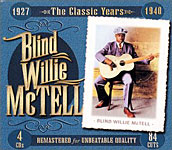 Willie McTell was not a major influence
in the early blues world, on the order of Jefferson, Carr, or Johnson,
but he was a brilliant and extremely varied artist, and to my tastes
the only performer of this period who is well-served by a complete
box set. McTell was an Atlanta-based street singer who played a lot
of blues, but also minstrel-style monologues, gospel, ragtime, and
hillbilly numbers. His twelve-string guitar work ranges from intricate
fingerpicking to supple slide that recalls his friend Blind Willie
Johnson, and perfectly frames his songs. Bob Dylan sang that "Nobody
can sing the blues like Blind Willie McTell," and it is true. His
light vocals are a world away from the Delta moans, but remain soulful,
and his work has an imagination and humor that few rural artists ever
matched. This set includes all his prewar sides, from commercial recordings
like "Statesboro Blues" to his Library of Congress Recordings, which
show him singing pop oddities like the ragtime ode to King Edward's
abdication. Far too few modern-day blues artists have chosen to follow
McTell's model, and it is our loss.
Willie McTell was not a major influence
in the early blues world, on the order of Jefferson, Carr, or Johnson,
but he was a brilliant and extremely varied artist, and to my tastes
the only performer of this period who is well-served by a complete
box set. McTell was an Atlanta-based street singer who played a lot
of blues, but also minstrel-style monologues, gospel, ragtime, and
hillbilly numbers. His twelve-string guitar work ranges from intricate
fingerpicking to supple slide that recalls his friend Blind Willie
Johnson, and perfectly frames his songs. Bob Dylan sang that "Nobody
can sing the blues like Blind Willie McTell," and it is true. His
light vocals are a world away from the Delta moans, but remain soulful,
and his work has an imagination and humor that few rural artists ever
matched. This set includes all his prewar sides, from commercial recordings
like "Statesboro Blues" to his Library of Congress Recordings, which
show him singing pop oddities like the ragtime ode to King Edward's
abdication. Far too few modern-day blues artists have chosen to follow
McTell's model, and it is our loss.
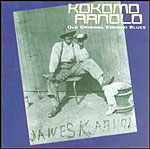 Considering all the focus on Robert Johnson,
it is baffling that so few contemporary blues fans have devoted much
attention to Kokomo Arnold, who provided Johnson with one of his most
obvious models, as well as the original versions of his two most popular
songs, "Sweet Home Chicago" (based on "Old Original Kokomo Blues") and
"I Believe I'll Dust My Broom" (whose lyrics are drawn from Arnold's
"Sagefield Woman" and "Sissy Man Blues"), and the pattern he used for
his one hit, "Terraplane Blues," which was originated in Arnold's "Milk
Cow Blues," a major hit that was covered not only by bluesmen, but also
by Bob Wills and his Texas Playboys and later by Elvis Presley. Arnold
was a strong singer, equally at home on slow, soulful songs and upbeat
rhythm numbers, and also the fastest slide guitarist of the early blues
era. His guitar lines are weirdly off-center flashes of virtuosity,
punctuating his vocals in counter-rhythms that are unlike anything else
on record. He was not much interested in recording, and many of his
records feel somewhat repetitive, but if one searches there is plenty
of variety, and Catfish records put together an excellent anthology
that is unfortunately out of print. At present, the best offering is
this Japanese disc, but it is pretty pricey, and hopefully a better
option will appear in the near future.
Considering all the focus on Robert Johnson,
it is baffling that so few contemporary blues fans have devoted much
attention to Kokomo Arnold, who provided Johnson with one of his most
obvious models, as well as the original versions of his two most popular
songs, "Sweet Home Chicago" (based on "Old Original Kokomo Blues") and
"I Believe I'll Dust My Broom" (whose lyrics are drawn from Arnold's
"Sagefield Woman" and "Sissy Man Blues"), and the pattern he used for
his one hit, "Terraplane Blues," which was originated in Arnold's "Milk
Cow Blues," a major hit that was covered not only by bluesmen, but also
by Bob Wills and his Texas Playboys and later by Elvis Presley. Arnold
was a strong singer, equally at home on slow, soulful songs and upbeat
rhythm numbers, and also the fastest slide guitarist of the early blues
era. His guitar lines are weirdly off-center flashes of virtuosity,
punctuating his vocals in counter-rhythms that are unlike anything else
on record. He was not much interested in recording, and many of his
records feel somewhat repetitive, but if one searches there is plenty
of variety, and Catfish records put together an excellent anthology
that is unfortunately out of print. At present, the best offering is
this Japanese disc, but it is pretty pricey, and hopefully a better
option will appear in the near future.
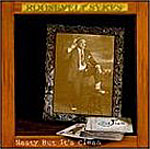 Roosevelt Sykes was one of the biggest sellers of the blues era,
and remained a funny and exciting musician until late in the blues revival,
but was passed over by a lot of people because he played piano instead
of guitar. This album shows just how ridiculous that prejudice was.
It ranges from straight blues numbers like his career-making "44 Blues"
(adapted by both Skip James and Robert Johnson) to wonderful off-color
romps and excentricities like "Journey to the Germs." One could file
Sykes with the other double-entendre hokum bluesmen, but there is a
verve to his records that the others rarely if ever matched. Anyone
looking for a father figure for rock 'n' roll will find more affinities
in Sykes's exuberant boogie-woogie than in all the deep Delta blues
ever recorded. This anthology is a truly exceptional set, well-programmed
to highlight Sykes's strengths, and is one of the most entertaining
records I have come across in recent years. Great driving music.
Roosevelt Sykes was one of the biggest sellers of the blues era,
and remained a funny and exciting musician until late in the blues revival,
but was passed over by a lot of people because he played piano instead
of guitar. This album shows just how ridiculous that prejudice was.
It ranges from straight blues numbers like his career-making "44 Blues"
(adapted by both Skip James and Robert Johnson) to wonderful off-color
romps and excentricities like "Journey to the Germs." One could file
Sykes with the other double-entendre hokum bluesmen, but there is a
verve to his records that the others rarely if ever matched. Anyone
looking for a father figure for rock 'n' roll will find more affinities
in Sykes's exuberant boogie-woogie than in all the deep Delta blues
ever recorded. This anthology is a truly exceptional set, well-programmed
to highlight Sykes's strengths, and is one of the most entertaining
records I have come across in recent years. Great driving music.
 Charlie (or Charley) Patton was the central
figure in the style now called "Delta blues." This was only one of many
styles played in the region, but it produced some astonishingly varied
and powerful musicians, including Son House and to some extent Robert
Johnson. Patton was the founding father of this style, but his tastes
ranged far more widely than that title suggests. Born in 1891, he grew
up before the blues era, and his repertoire reflects this fact, including
a range of material that might make him kin to such black "folk" artists
as Leadbelly. Among his many styles, though, was the most rhythmically
intricate blues work on record. In songs like "Down the Dirt Road" and
"Screamin' and Hollerin' the Blues" he builds up an astounding set of
competing rhythms, like a full African drumming group living in one
body. When this rhythmic virtuosity is combined with the gruff, shouting
force of his singing, it is not surprising that he is now considered
the toughest and most important artist of his region, and by some accounts
the one-man root of rock 'n' roll. That is an oversimplification, of
course, but it also does a disservice to Patton himself, who could also
be a swinging, funny ragtime player or an astute composer of story-songs.
This new Yazoo set is an excellent sampler of his work, with better
sound quality than ever before.
Charlie (or Charley) Patton was the central
figure in the style now called "Delta blues." This was only one of many
styles played in the region, but it produced some astonishingly varied
and powerful musicians, including Son House and to some extent Robert
Johnson. Patton was the founding father of this style, but his tastes
ranged far more widely than that title suggests. Born in 1891, he grew
up before the blues era, and his repertoire reflects this fact, including
a range of material that might make him kin to such black "folk" artists
as Leadbelly. Among his many styles, though, was the most rhythmically
intricate blues work on record. In songs like "Down the Dirt Road" and
"Screamin' and Hollerin' the Blues" he builds up an astounding set of
competing rhythms, like a full African drumming group living in one
body. When this rhythmic virtuosity is combined with the gruff, shouting
force of his singing, it is not surprising that he is now considered
the toughest and most important artist of his region, and by some accounts
the one-man root of rock 'n' roll. That is an oversimplification, of
course, but it also does a disservice to Patton himself, who could also
be a swinging, funny ragtime player or an astute composer of story-songs.
This new Yazoo set is an excellent sampler of his work, with better
sound quality than ever before.
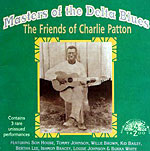 Another excellent anthology from Yazoo,
this set was designed to showcase the circle of musicians influenced
by Charlie Patton, and whether or not one buys the idea that Patton
was the most important blues artist of the 1920s, the Mississippi Delta-style
players were certainly among the most exciting musicians of the 20th
century, and this set is particularly important for including all the
early recordings of Son House, and many of the best of Tommy Johnson.
Both of these artists are historically important, but more than that
they are brilliant, unique musicians who are tragically under-represented
on record. Also included here are cuts by the pianist-singer Louise
Johnson and other Delta figures. The sound is, as usual, exceptionally
clear, though the House tracks have survived only in one or two scratchy
examples, and there is nothing that can be done to make them sound clean
without losing a lot of the music. That said, the astounding power of
House's vocals, and his slashing slide lines are worth the effort.
Another excellent anthology from Yazoo,
this set was designed to showcase the circle of musicians influenced
by Charlie Patton, and whether or not one buys the idea that Patton
was the most important blues artist of the 1920s, the Mississippi Delta-style
players were certainly among the most exciting musicians of the 20th
century, and this set is particularly important for including all the
early recordings of Son House, and many of the best of Tommy Johnson.
Both of these artists are historically important, but more than that
they are brilliant, unique musicians who are tragically under-represented
on record. Also included here are cuts by the pianist-singer Louise
Johnson and other Delta figures. The sound is, as usual, exceptionally
clear, though the House tracks have survived only in one or two scratchy
examples, and there is nothing that can be done to make them sound clean
without losing a lot of the music. That said, the astounding power of
House's vocals, and his slashing slide lines are worth the effort.
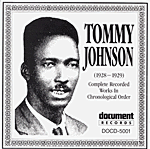 Tommy Johnson was a fine guitarist in
the Patton style, but his most impressive aspect is his singing. He
had a smooth, but achingly soulful voice, with a falsetto that would
be immitated by many other Mississippi singers. Unfortunately, he recorded
very few sides, and even some of these are annoyingly repetitive. Like
virtually all rural guitarists of his time, he played a huge range of
material, and was stifled by the record companies' refusal to record
anything but blues. The result of all of this is that his complete recordings,
few as they are, are not really required listening, but one does want
a good, solid set of his seven or eight greatest sides. That is exactly
what Catfish records provided on Tommy Johnson & Associates,
but this disc is now pretty hard to find in the US (Though a good record
store can hunt it down, and Amazon sometimes has copies, if you want
to try your chances by clicking here.)
The Yazoo disc above has a pretty fair selection of Johnson's discs,
but they are mixed in rather than set apart by themselves, and do not
include one of his most beautiful and distinctive vocals, "Cool Drink
of Water," with its floating falsetto. If you cannot get the Catfish
set, I would suggest biting the bullet and getting his Complete Recorded
Works (1928-1929), which any hardcore blues fan will want in any
case, despite the rather iffy quality of Document's sound.
Tommy Johnson was a fine guitarist in
the Patton style, but his most impressive aspect is his singing. He
had a smooth, but achingly soulful voice, with a falsetto that would
be immitated by many other Mississippi singers. Unfortunately, he recorded
very few sides, and even some of these are annoyingly repetitive. Like
virtually all rural guitarists of his time, he played a huge range of
material, and was stifled by the record companies' refusal to record
anything but blues. The result of all of this is that his complete recordings,
few as they are, are not really required listening, but one does want
a good, solid set of his seven or eight greatest sides. That is exactly
what Catfish records provided on Tommy Johnson & Associates,
but this disc is now pretty hard to find in the US (Though a good record
store can hunt it down, and Amazon sometimes has copies, if you want
to try your chances by clicking here.)
The Yazoo disc above has a pretty fair selection of Johnson's discs,
but they are mixed in rather than set apart by themselves, and do not
include one of his most beautiful and distinctive vocals, "Cool Drink
of Water," with its floating falsetto. If you cannot get the Catfish
set, I would suggest biting the bullet and getting his Complete Recorded
Works (1928-1929), which any hardcore blues fan will want in any
case, despite the rather iffy quality of Document's sound.
 Son House was the greatest singer in the
Mississippi Delta, and earned enduring fame by acting as teacher and
mentor to both Robert Johnson and Muddy Waters. However, Waters often
pointed out that House was never really captured on record, and it is
hard not to agree with him. The prewar commercial recordings available
on the Yazoo Delta set above are his greatest, but badly recorded and
marred by years of heavy playing, and they amount to less than a half-dozen
songs. His Complete Library of Congress Sessions (Travelin' Man records)
give a fuller view of his repertoire, as well as showing him with
the sort of rural band that he often used in the Delta juke joints,
but I find his singing relatively desultory and below the quality of
what he did either earlier or in the 1960s. (Many people disagree with
me, and it is certainly worth checking out these recordings, which are
available here.) House was "rediscovered" in the 1960s, and while his
playing may not have been as precise as in the prewar era, his voice
was still magnificent and, to my taste, these are his most satisfying
recordings. The best of them were done shortly after he reemerged on
the scene, for Columbia records, but unfortunately Sony has provided
a choice of too little or too much: Original Delta Blues is the
original LP, and includes House's greatest later work, but is quite
short and could easily have been fleshed out with additional tracks
recorded at the time. On the other hand, Father Of The Delta Blues:
The Complete 1965 Sessions is a two-CD set that includes all of
the tracks I wish were on the former set, but also a bunch of alternate
takes that no one but the most hardcore fan really needs....
Son House was the greatest singer in the
Mississippi Delta, and earned enduring fame by acting as teacher and
mentor to both Robert Johnson and Muddy Waters. However, Waters often
pointed out that House was never really captured on record, and it is
hard not to agree with him. The prewar commercial recordings available
on the Yazoo Delta set above are his greatest, but badly recorded and
marred by years of heavy playing, and they amount to less than a half-dozen
songs. His Complete Library of Congress Sessions (Travelin' Man records)
give a fuller view of his repertoire, as well as showing him with
the sort of rural band that he often used in the Delta juke joints,
but I find his singing relatively desultory and below the quality of
what he did either earlier or in the 1960s. (Many people disagree with
me, and it is certainly worth checking out these recordings, which are
available here.) House was "rediscovered" in the 1960s, and while his
playing may not have been as precise as in the prewar era, his voice
was still magnificent and, to my taste, these are his most satisfying
recordings. The best of them were done shortly after he reemerged on
the scene, for Columbia records, but unfortunately Sony has provided
a choice of too little or too much: Original Delta Blues is the
original LP, and includes House's greatest later work, but is quite
short and could easily have been fleshed out with additional tracks
recorded at the time. On the other hand, Father Of The Delta Blues:
The Complete 1965 Sessions is a two-CD set that includes all of
the tracks I wish were on the former set, but also a bunch of alternate
takes that no one but the most hardcore fan really needs....
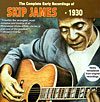 Skip James was the most soulful musician in
blues, a unique genius whose style relies on an unusual minor-key guitar
tuning and eerie falsetto vocals. There are blues experts who argue
that he was merely one representative of a local style in his hometown
of Bentonia, but I tend to think that the other Bentonia players were
influenced by James, and in any case they never approached his level
of artistry. James's 1931 recordings, available on Yazoo's The Complete
Early Recordings, are one of the greatest bodies of work in American
music, ranging from meditative guitar moans to examples of James's anarchic,
brilliant piano work. Every blues fan needs this album, and it has a
power and depth that transcends the genre and should make it obligatory
listening for anyone who likes serious music or any sort.
Skip James was the most soulful musician in
blues, a unique genius whose style relies on an unusual minor-key guitar
tuning and eerie falsetto vocals. There are blues experts who argue
that he was merely one representative of a local style in his hometown
of Bentonia, but I tend to think that the other Bentonia players were
influenced by James, and in any case they never approached his level
of artistry. James's 1931 recordings, available on Yazoo's The Complete
Early Recordings, are one of the greatest bodies of work in American
music, ranging from meditative guitar moans to examples of James's anarchic,
brilliant piano work. Every blues fan needs this album, and it has a
power and depth that transcends the genre and should make it obligatory
listening for anyone who likes serious music or any sort.
 James was also unique in his later recordings.
Unlike any of the other early bluesmen who were "rediscovered" in the
1960s, he had continued to substantially develop his art. His voice
had deepened with age, but rather than lowering his guitar to match
it, he reformulated his vocal style to rely almost entirely on his entrancing
falsetto, creating music that is in some ways even more hypnotically
soulful than his early work. There is an absurd school of blues "experts"
who are so utterly caught up in guitar virtuosity that they dismiss
all these later recordings as hopelessly inferior, but they are simply
wrong. James also remained a powerful songwriter, continuing to produce
masterpieces like "Washington DC Hospital Bed Blues." Vanguard Sessions:
Blues From The Delta is beautifully recorded, and is the basic document
of this later period.
James was also unique in his later recordings.
Unlike any of the other early bluesmen who were "rediscovered" in the
1960s, he had continued to substantially develop his art. His voice
had deepened with age, but rather than lowering his guitar to match
it, he reformulated his vocal style to rely almost entirely on his entrancing
falsetto, creating music that is in some ways even more hypnotically
soulful than his early work. There is an absurd school of blues "experts"
who are so utterly caught up in guitar virtuosity that they dismiss
all these later recordings as hopelessly inferior, but they are simply
wrong. James also remained a powerful songwriter, continuing to produce
masterpieces like "Washington DC Hospital Bed Blues." Vanguard Sessions:
Blues From The Delta is beautifully recorded, and is the basic document
of this later period.
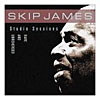 However, there is another side to James,
of which most of us were unaware until very recently. Along with his
unique personal style, he was also a masterly interpreter of a wide
range of other music. A wonderful new release of material from the Vanguard
vaults, Studio Sessions: Rare & Unreleased, finds James playing
such surprising material as a piano version of the Hoagy Carmichael/Johnny
Mercer hit "Lazybones" and versions of Bessie Smith and other blues
hits, as well as a couple of vaudevillian numbers and various hymns
and boogies. If it is not as resoundingly brilliant as James's deeper
work, this is still great music, and fills out our picture of this musical
master.
However, there is another side to James,
of which most of us were unaware until very recently. Along with his
unique personal style, he was also a masterly interpreter of a wide
range of other music. A wonderful new release of material from the Vanguard
vaults, Studio Sessions: Rare & Unreleased, finds James playing
such surprising material as a piano version of the Hoagy Carmichael/Johnny
Mercer hit "Lazybones" and versions of Bessie Smith and other blues
hits, as well as a couple of vaudevillian numbers and various hymns
and boogies. If it is not as resoundingly brilliant as James's deeper
work, this is still great music, and fills out our picture of this musical
master.
 In their day, the Mississippi Sheiks were the most
popular recording band in rural Mississippi, and had at least one huge
national hit, "Sitting On Top of the World," which was covered by white
and black bands alike. Basically a duo, though the personel could shift
from time to time, the Sheiks featured Lonnie Chatmon's violin and Walter
Vinson's vocals and guitar, and although most of their records are blues,
they could play everything from fiddle hoedowns to the latest pop hits.
This is an excellent anthology, and gives a good picture of their recorded
work -- from soulful blues to sprightly fiddle -- though it only scrapes
the surface of their repertoire. An interesting picture of their broader
scope can be found in the later recordings of Sam Chatmon, Lonnie's
brother.
In their day, the Mississippi Sheiks were the most
popular recording band in rural Mississippi, and had at least one huge
national hit, "Sitting On Top of the World," which was covered by white
and black bands alike. Basically a duo, though the personel could shift
from time to time, the Sheiks featured Lonnie Chatmon's violin and Walter
Vinson's vocals and guitar, and although most of their records are blues,
they could play everything from fiddle hoedowns to the latest pop hits.
This is an excellent anthology, and gives a good picture of their recorded
work -- from soulful blues to sprightly fiddle -- though it only scrapes
the surface of their repertoire. An interesting picture of their broader
scope can be found in the later recordings of Sam Chatmon, Lonnie's
brother.
 Of
the many good musicians still playing blues, I must single out Paul's
work. Not only is he one of the greatest guitarists ever, as well as
a fine harmonica player and singer, but -- more unusually on the modern
scene -- he injects his own personality into everything he sings, so
that even if the song started out with Blind Lemon Jefferson or Percy
Mayfield, it ends up being pure Geremia. (Though often retaining guitar
licks from the original.) He combines the swing and humor of Willie
McTell with the virtuosity of Lonnie Johnson, and an insistence on keeping
the music alive and contemporary. This, his latest album, is an excellent
introduction, ranging from Jefferson to Mayfield to Geremia's own compositions.
Playing solo, on guitar, harmonica, and occasionally piano, he remains
the most consistently satisfying artist on the acoustic blues scene.
Of
the many good musicians still playing blues, I must single out Paul's
work. Not only is he one of the greatest guitarists ever, as well as
a fine harmonica player and singer, but -- more unusually on the modern
scene -- he injects his own personality into everything he sings, so
that even if the song started out with Blind Lemon Jefferson or Percy
Mayfield, it ends up being pure Geremia. (Though often retaining guitar
licks from the original.) He combines the swing and humor of Willie
McTell with the virtuosity of Lonnie Johnson, and an insistence on keeping
the music alive and contemporary. This, his latest album, is an excellent
introduction, ranging from Jefferson to Mayfield to Geremia's own compositions.
Playing solo, on guitar, harmonica, and occasionally piano, he remains
the most consistently satisfying artist on the acoustic blues scene.